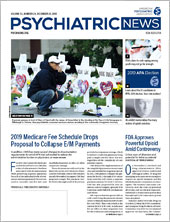Negative thoughts about psychotic experiences and fears of losing mental control may heighten the risk of suicide in patients with psychosis who were not taking antipsychotics, suggests a report posted November 2 in Schizophrenia Bulletin.
“Overall, our findings emphasize the importance of clinicians promoting a recovery-focused and appropriately optimistic outlook when working with people with psychosis, taking care to avoid providing information that might heighten negative illness appraisals and/or fears of losing mental control,” wrote Paul Hutton, Ph.D., of the Edinburgh Napier University in the United Kingdom and colleagues.
They analyzed data on the effect of “metacognition” on suicidal thinking. Metacognition refers to knowledge and beliefs relating to the structure and integrity of the self and one’s own cognitive processes.
In their report, they noted that estimates of suicide rates among individuals diagnosed with schizophrenia spectrum disorders range from 5 to 10 percent, making it a leading cause of premature death in this population.
“Given antipsychotics have their strongest effects on the positive symptoms of psychosis, it is plausible that individuals not taking this medication may have greater positive symptom severity than those who do—and that this accounts for their increased suicide risk,” Hutton and colleagues wrote. Yet the researchers said evidence on the contribution of positive symptoms to suicide risk remains unclear, with some studies suggesting no association.
Other studies, however, have found that the way a person interprets or “appraises” their psychotic experiences may be more important than symptom severity for predicting suicidal behavior. For instance, a review published in the British Journal of Psychiatry in 2005 found that people with psychosis who die by suicide were more likely to have “fears of mental disintegration” than those with psychosis who did not die by suicide.
In their report, Hutton and colleagues described analyzing data on 68 patients enrolled in the ACTION trial, a pilot trial designed to assess the effects of cognitive therapy on individuals with schizophrenia who had not taken antipsychotics for at least six months. At the start of the study and follow-ups at nine and 18 months, the researchers measured the patients’ psychotic symptoms using the Positive and Negative Symptom Scale; they also measured negative beliefs and attitudes using the Personal Beliefs About Experiences Questionnaire and the Metacognitions Questionnaire-30.
The researchers found that symptoms of psychosis were more likely to be linked to suicidal thinking at nine to 18 months when the patients held negative thoughts and fears. Negative thoughts and fears about consequences of symptoms leading to loss of mental control accounted for 37 percent of the association between those symptoms and suicidal thinking, according to the report.
They wrote, “The emergence of suicidal ideation can be conceptualized as not only a response to symptoms and related perceptions of defeat and entrapment, but also as attempts at cognitive control, motivated by worry about the uncontrollability and danger of worry itself.”
Hutton and colleagues called for more randomized, controlled trials to examine the effect of special therapies that address negative cognitive beliefs, such as metacognitive therapy, metacognitive reflection and insight therapy, and cognitive analytic therapy on suicidal thinking.
“Consistent with previous findings that fears of mental disintegration are strongly associated with suicide in psychosis, our results suggest that the way people appraise their symptoms and their consequences, including whether they [have] heighten[ed] concerns about losing mental control, may partly determine whether [their symptoms] lead to thoughts of suicide,” Hutton and colleagues wrote.
The study was a secondary analysis of a trial funded by the British National Institute for Health Research under its Research for Patient Benefit program. ■
“Suicidal Ideation in People With Psychosis Not Taking Antipsychotic Medication: Do Negative Appraisals and Negative Metacognitive Beliefs Mediate the Effect of Symptoms?” can be accessed
here. An abstract of “Schizophrenia and Suicide: A Systematic Review of Risk Factors” is available
here.

